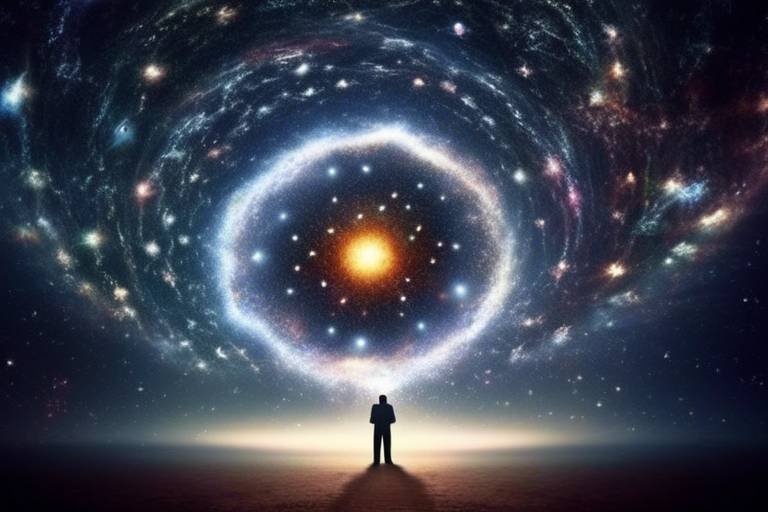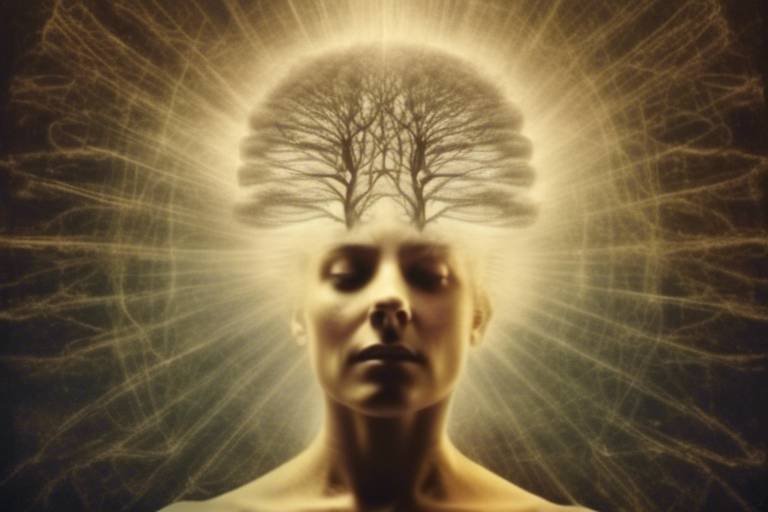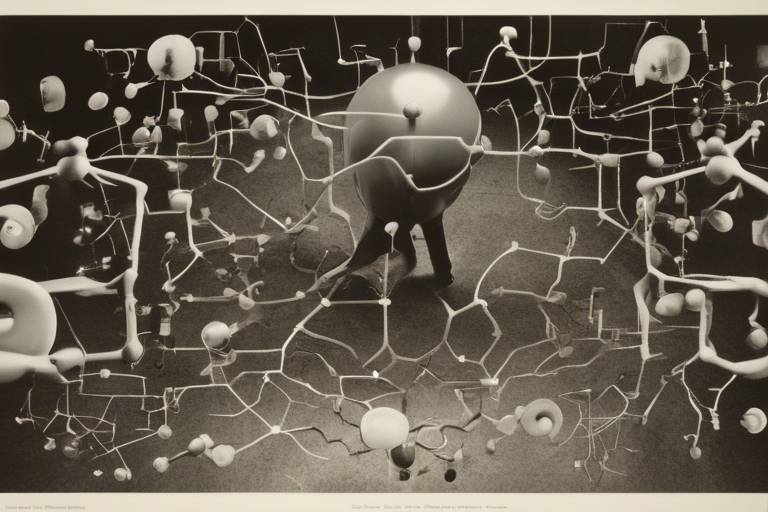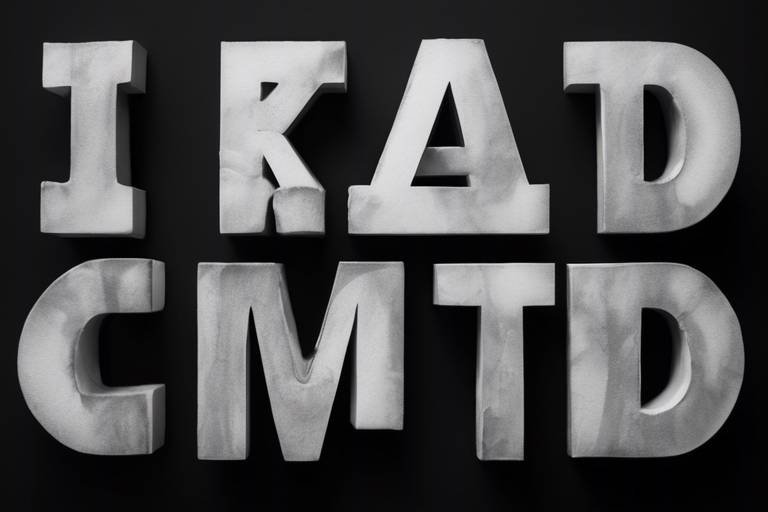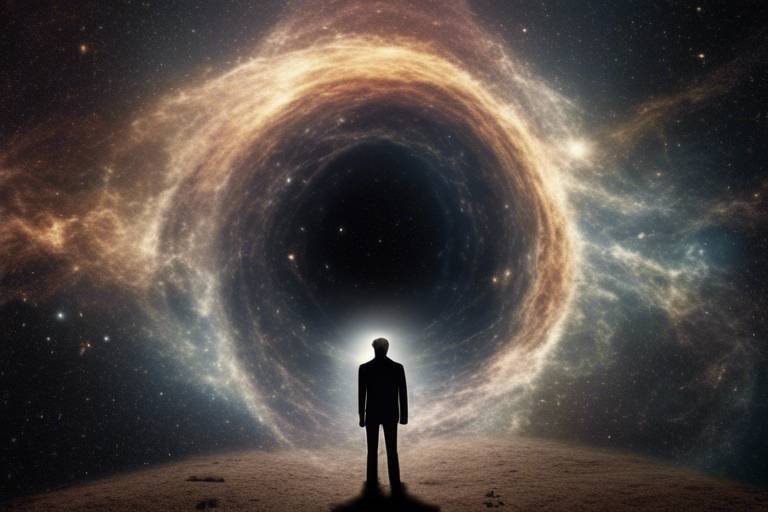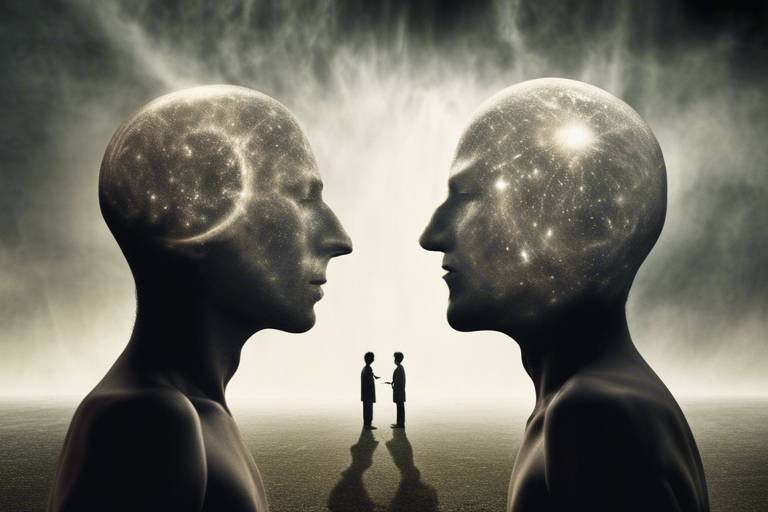Metaphysics - Looking Beyond Space and Time
Metaphysics is a fascinating branch of philosophy that invites us to explore the very fabric of reality. It goes beyond the tangible, urging us to question what we perceive and to delve into the essence of existence itself. Have you ever pondered why things exist rather than not? Or what lies beyond the physical world we experience every day? These questions are at the heart of metaphysical inquiry, challenging our understanding of space, time, and the nature of being.
At its core, metaphysics grapples with fundamental concepts such as existence, reality, and the relationship between mind and matter. It encourages us to look beyond the surface, to ask deeper questions about the universe and our place within it. In a world driven by scientific inquiry, metaphysics serves as a bridge connecting the empirical with the abstract, allowing us to explore realms that science may not fully capture.
Imagine metaphysics as a vast ocean, with each wave representing a different philosophical perspective. Some waves crash loudly against the shore, like the bold theories of Aristotle, while others ripple gently, reflecting more contemporary thinkers like Kant and Heidegger. Each wave contributes to the ever-evolving landscape of metaphysical thought, shaping our understanding of reality.
As we embark on this journey through metaphysics, we will encounter key philosophical perspectives that have shaped our understanding of existence. From Aristotle's foundational ideas about substance and causality to Kant's critique of traditional metaphysics, we will explore how these thinkers have influenced our perception of reality. Additionally, we will examine the intricate relationship between metaphysics and science, revealing how metaphysical assumptions underpin scientific theories and practices.
Furthermore, we will delve into the ethical implications of metaphysical beliefs, discussing how our understanding of existence can influence moral reasoning and decision-making. The interplay between determinism and free will, as well as existentialist perspectives on meaning, will highlight the profound connection between metaphysics and ethics.
In summary, metaphysics is not just an abstract field of study; it is a vital exploration of the questions that define our existence. It encourages us to think critically, to challenge our assumptions, and to seek a deeper understanding of the universe. So, are you ready to dive into the depths of metaphysical thought and discover what lies beyond the confines of space and time?
- What is metaphysics? Metaphysics is a branch of philosophy that explores the fundamental nature of reality, including concepts such as existence, being, and the relationship between mind and matter.
- Why is metaphysics important? Metaphysics allows us to question and understand the underlying principles of reality, helping us make sense of our experiences and the world around us.
- Who are some key figures in metaphysical thought? Influential metaphysical thinkers include Aristotle, Immanuel Kant, and Martin Heidegger, each contributing unique perspectives on existence and reality.
- How does metaphysics relate to science? Metaphysical assumptions often underlie scientific theories, shaping methodologies and interpretations of findings, creating an intricate relationship between the two fields.
- What are the ethical implications of metaphysical beliefs? Our understanding of existence can significantly influence moral reasoning, particularly in debates surrounding determinism, free will, and the search for meaning in life.

The Nature of Reality
The concept of reality is a profound inquiry that has puzzled philosophers, scientists, and thinkers for centuries. What is it that we truly perceive, and how does our understanding shape our existence? At its core, the nature of reality encompasses the essence of existence, substance, and the intricate relationship between mind and matter. This exploration can be likened to peeling an onion—each layer revealing deeper truths while also provoking more questions.
Philosophers have long debated the fundamental aspects of reality, with varying perspectives contributing to a rich tapestry of thought. Some argue that reality is purely physical, consisting of matter and energy, while others propose that it transcends the tangible, suggesting that consciousness plays a crucial role in shaping our perception of reality. For instance, consider how a beautiful sunset might evoke feelings of joy or nostalgia. Is the sunset merely a collection of photons and atmospheric conditions, or does it carry a deeper significance shaped by our experiences? This interplay between perception and reality invites us to reflect on our own beliefs and assumptions.
One of the key questions in metaphysical discussions is the distinction between existence and essence. Existence refers to the state of being, while essence pertains to the intrinsic nature or indispensable quality of something. To illustrate this, think of a chair. It exists as a physical object, but its essence—what makes it a chair—includes its function, design, and the experiences it facilitates. This distinction becomes crucial when examining how we define reality and what we consider to be 'real.'
Furthermore, the relationship between mind and matter is another pivotal aspect of understanding reality. Are our thoughts and perceptions merely byproducts of physical processes, or do they hold a significant role in constructing our reality? This leads us to the philosophical debate of idealism versus materialism. Idealists assert that the mind is the primary reality, while materialists argue that the material world is the foundation upon which everything else is built. This debate is not merely academic; it influences how we approach various fields, from science to ethics.
As we delve deeper into the nature of reality, we must also consider how metaphysical assumptions underpin our understanding of the universe. For example, the belief in an objective reality—that the world exists independently of our perceptions—shapes scientific inquiry. Scientists operate under the assumption that their observations reflect an underlying reality, which drives the pursuit of knowledge and understanding. However, as we explore the cosmos and the intricacies of quantum mechanics, we encounter phenomena that challenge traditional notions of reality, blurring the lines between observer and observed.
In summary, the nature of reality is a complex and multifaceted concept that invites us to question our beliefs and perceptions. It pushes us to consider the essence of existence, the interplay between mind and matter, and the implications of our understanding for various fields of inquiry. As we continue to explore these profound questions, we find that the journey is as significant as the answers we seek.
- What is metaphysics? Metaphysics is a branch of philosophy that explores the fundamental nature of reality, including concepts such as existence, being, and the relationship between mind and matter.
- How does metaphysics relate to science? Metaphysical assumptions often underpin scientific theories and practices, influencing how scientists interpret their findings and understand the universe.
- What is the difference between existence and essence? Existence refers to the state of being, while essence pertains to the intrinsic nature or indispensable quality of something.
- Can our perceptions shape reality? Yes, many philosophers argue that our perceptions and consciousness play a crucial role in shaping our understanding of reality.

Key Philosophers in Metaphysics
Metaphysics, the branch of philosophy that delves into the fundamental nature of reality, has been shaped and enriched by numerous thinkers throughout history. These philosophers have laid the groundwork for our understanding of existence, substance, and the relationship between mind and matter. Among these influential figures, Aristotle, Kant, and Heidegger stand out as pivotal contributors to metaphysical thought.
Aristotle, often referred to as the father of Western philosophy, introduced many concepts that continue to resonate in metaphysical discussions today. His exploration of substance and essence provides a framework for understanding what it means for something to exist. Aristotle believed that everything in the universe is composed of substances, which are the fundamental entities that make up reality. To him, understanding the essence of a substance—what it is at its core—was crucial for grasping the nature of existence.
Aristotle's metaphysical framework is built upon several key ideas. He introduced the concepts of potentiality and actuality, which are critical for understanding change and existence. Potentiality refers to the capacity for change, while actuality is the realization of that potential. For example, consider a seed; it has the potential to grow into a tree, but it only becomes an actual tree when it has undergone the necessary changes to reach that state. This distinction is not merely academic; it has profound implications for how we perceive growth, development, and the nature of reality itself.
When discussing substance, Aristotle emphasized the importance of distinguishing between essence and existence. Essence refers to the essential characteristics that define a substance, while existence is the state of being. This distinction helps clarify why some entities exist while others do not. For instance, the essence of a tree includes its characteristics such as being a plant, having leaves, and being rooted in the ground. However, the existence of that tree depends on various factors, including its environment and circumstances.
Aristotle's notions of potentiality and actuality are vital for metaphysical discussions. They emphasize that reality is not static; rather, it is dynamic and constantly evolving. This perspective invites us to consider how potentiality shapes our understanding of existence. Just as a caterpillar has the potential to become a butterfly, so too do all entities possess inherent potentials waiting to be realized. This interplay between potentiality and actuality encourages a more nuanced view of reality, one that embraces change and growth.
Fast forward to the 18th century, and we encounter Immanuel Kant, a philosopher who profoundly challenged traditional metaphysical frameworks. Kant argued that our understanding of reality is limited by our perceptions and experiences. He proposed a distinction between phenomena (the world as we experience it) and noumena (the world as it exists independently of our perceptions). This critique suggests that while we can study and understand the phenomena, the noumena remain elusive and fundamentally unknowable.
Kant's ideas reshaped metaphysical inquiries, leading to questions about the nature of knowledge and reality. He posited that our understanding of the world is inherently shaped by our cognitive faculties, which imposes a structure on our experiences. This brings us to the realization that metaphysics isn't just about what exists, but also about how we come to know and understand that existence.
In summary, the contributions of philosophers like Aristotle and Kant have profoundly influenced metaphysical thought. Their explorations into the nature of reality, substance, and existence continue to spark discussions and debates in philosophical circles today. Understanding their perspectives not only enriches our grasp of metaphysics but also encourages us to ponder the deeper questions of existence and our place within it.
- What is metaphysics? Metaphysics is the branch of philosophy that studies the fundamental nature of reality, including concepts such as existence, objects, and their properties.
- Who are the key philosophers in metaphysics? Important figures include Aristotle, Kant, and Heidegger, each of whom contributed significantly to our understanding of existence and reality.
- What is the difference between potentiality and actuality? Potentiality refers to the capacity for change, while actuality is the realization of that potential.
- How does Kant's critique influence metaphysics? Kant's critique highlights the limitations of human understanding, distinguishing between phenomena (what we can perceive) and noumena (what exists beyond our perception).

Aristotle's Metaphysical Framework
Aristotle, one of the most influential philosophers in history, laid the groundwork for metaphysics as we understand it today. His approach to metaphysics is not just an academic exercise; it’s a profound exploration of the very essence of existence. Aristotle believed that to understand the world, we must first grasp the fundamental concepts of substance, causality, and being. These concepts serve as the pillars of his metaphysical framework, allowing us to dissect reality into manageable parts.
At the heart of Aristotle's metaphysics is the notion of substance. He argued that everything in the universe is composed of substances, which are the primary realities that exist independently. For Aristotle, a substance is not merely a physical object; it embodies both essence and existence. To illustrate this, consider a tree: its essence is what makes it a tree (its characteristics and properties), while its existence refers to the fact that it is a tangible entity in the world. This distinction is crucial because it helps us understand how different entities relate to one another and to the universe as a whole.
Aristotle further elaborated on the concepts of potentiality and actuality, which are essential for grasping his metaphysical thoughts. Potentiality refers to the inherent capacity of a substance to develop into a particular state or form, while actuality is the realization of that potential. For example, a seed has the potentiality to become a tree, but it only becomes an actual tree when it grows and develops in the right conditions. This distinction is not just a philosophical abstraction; it has practical implications for understanding change and development in the natural world.
To better understand these concepts, let’s summarize them in a table:
| Concept | Description |
|---|---|
| Substance | The fundamental reality that exists independently and has both essence and existence. |
| Essence | The intrinsic properties that define what a substance is. |
| Existence | The state of being real or having objective reality. |
| Potentiality | The inherent capacity of a substance to develop into a specific state. |
| Actuality | The realization of a substance's potential; the state of being actual. |
Aristotle’s framework also investigates the principles of causality. He proposed four types of causes to explain why things exist and change: the material cause (what something is made of), the formal cause (the form or essence of something), the efficient cause (the agent that brings something into being), and the final cause (the purpose or function of something). This comprehensive approach allows us to see not just the 'what' of existence but also the 'why' behind it, enriching our understanding of reality.
In conclusion, Aristotle's metaphysical framework offers a profound lens through which we can examine existence and reality. By distinguishing between substance, essence, potentiality, and actuality, he provides us with the tools to explore the complexities of the universe. His ideas continue to resonate, prompting us to question our own understanding of what it means to exist. So, the next time you ponder the nature of reality, remember Aristotle’s insights—they might just illuminate the path to deeper understanding.

Substance and Essence
When we dive into the depths of metaphysics, one of the most intriguing concepts we encounter is the distinction between substance and essence. Aristotle, the grandmaster of metaphysical thought, laid the groundwork for understanding these two terms, and they continue to shape philosophical discussions today. But what do these terms really mean? Imagine for a moment that you are looking at a beautiful statue. The substance of the statue is the marble from which it is carved, while its essence is the form or idea that the artist had in mind when creating it. This analogy helps illustrate the profound difference between the two.
Substance refers to what something is made of, the material reality that underpins existence. In Aristotle's view, substances are individual entities that exist independently. They are the building blocks of reality, the tangible things we can see, touch, and interact with. Essence, on the other hand, is more abstract. It is the defining characteristic or quality that makes a substance what it is. For instance, the essence of a tree might include its ability to grow, produce leaves, and provide shade. Without its essence, a tree would merely be a collection of wood and leaves without the qualities that define it as a tree.
To further clarify, let’s break down the concepts of substance and essence into a simple table:
| Concept | Definition | Example |
|---|---|---|
| Substance | The material or entity that exists independently. | A marble statue, a tree, a human being. |
| Essence | The intrinsic nature or quality that defines a substance. | The artistic vision of the statue, the life processes of the tree, the consciousness of a human. |
This distinction is crucial, as it leads us to questions about identity and change. Can a substance change while retaining its essence? For instance, if we were to carve the marble statue into a different shape, we would still recognize it as a statue, but its substance would have changed. Yet, its essence—being a work of art—might remain intact. This interplay between substance and essence invites us to ponder deeper philosophical questions about existence and reality.
Moreover, Aristotle's exploration of substance and essence prompts us to consider the nature of change itself. He posited that substances can exist in various states, leading to the concepts of potentiality and actuality. Potentiality refers to the capacity of a substance to become something else, while actuality is the realization of that potential. For example, an acorn has the potential to become an oak tree, but it is only when it grows that it achieves its actuality.
In summary, understanding the relationship between substance and essence is fundamental to grasping the complexities of metaphysical thought. It challenges us to think about what it means to exist and how we define the world around us. As we continue to explore metaphysical concepts, keeping the distinction between substance and essence in mind will help us navigate the deeper waters of philosophical inquiry.
- What is the difference between substance and essence?
Substance refers to the material or entity that exists independently, while essence is the intrinsic nature or quality that defines that substance. - How do substance and essence relate to identity?
The relationship between substance and essence raises questions about identity, especially concerning how changes in substance affect the essence of an entity. - Can a substance change while retaining its essence?
Yes, a substance can undergo changes while its essence remains the same, as illustrated by the example of a statue being reshaped but still recognized as a work of art.

Potentiality and Actuality
Aristotle’s concepts of potentiality and actuality are pivotal in understanding the dynamics of change and existence. Imagine you have a seed. In its current state, it holds the potential to become a magnificent tree, but until it is nurtured and planted in the right conditions, it remains just that—a seed. This analogy beautifully illustrates Aristotle's distinction: potentiality is the inherent capacity for change, while actuality is the realization of that potential.
To delve deeper, let's break down these two terms:
- Potentiality: This refers to the possibilities that exist within an entity. It is the dormant state, full of possibilities waiting to be actualized. For example, a young artist has the potential to create masterpieces, but until they pick up a brush and begin to paint, that potential remains unfulfilled.
- Actuality: This is the state of being that occurs when potential is realized. Using the same artist analogy, the moment they complete a painting, they have transitioned from potentiality to actuality. Their creativity has manifested into something tangible.
Aristotle argued that everything in the universe is in a constant state of flux, moving between these two states. This movement is essential for understanding change and growth. For instance, a caterpillar has the potential to become a butterfly. The transformation process is where potentiality is actualized, revealing the creature's true form. Aristotle believed that this interplay is fundamental to all beings and their existence.
This distinction also plays a significant role in metaphysical discussions about reality. If we consider the universe, it is filled with entities that possess both potential and actual states. The challenge lies in recognizing that potentiality is not merely a passive state; it requires action and conditions to transform into actuality. This brings us to an important question: What are the necessary conditions that allow potentiality to become actuality? Understanding this can lead to profound insights into the nature of existence itself.
In summary, Aristotle’s notions of potentiality and actuality are not just abstract concepts; they are fundamental to our understanding of reality. They encourage us to look beyond what is immediately visible and to consider what could be. This perspective can shift our approach to life, prompting us to seek out the potential in ourselves and others. The journey from potentiality to actuality is not just a philosophical inquiry but a personal one, inviting us to explore our own capabilities and aspirations.
1. What is the difference between potentiality and actuality?
Potentiality refers to the inherent capacity for change and growth within an entity, while actuality is the realization of that potential. It’s the difference between what could be and what is.
2. How do these concepts relate to personal growth?
Understanding potentiality and actuality can inspire individuals to recognize their own capabilities and strive towards actualizing their dreams and aspirations.
3. Are potentiality and actuality relevant in modern philosophy?
Yes, these concepts continue to influence various fields, including metaphysics, ethics, and even psychology, as they address the nature of existence and change.

Kant's Critique of Metaphysics
Immanuel Kant, a towering figure in Western philosophy, revolutionized our understanding of metaphysics with his critical approach. In his seminal work, Critique of Pure Reason, Kant challenges traditional metaphysical inquiries that seek to understand the nature of reality beyond human experience. He famously argues that our knowledge is limited to what we can perceive through our senses, thus positing a distinction between phenomena (the world as we experience it) and noumena (the world as it is in itself).
One of the key elements of Kant's critique is his assertion that metaphysical claims about the universe—such as the existence of God, the immortality of the soul, and the freedom of the will—are not justifiable through reason alone. He believed that while these concepts are essential to human thought, they lie beyond the realm of possible experience, making them inherently speculative. Kant's skepticism invites us to reconsider how we approach questions of existence and reality, suggesting that we must ground our inquiries in empirical evidence rather than abstract reasoning.
To illustrate this point, Kant introduces the concept of the transcendental idealism, which posits that our understanding of reality is shaped by the inherent structures of our mind. According to Kant, we do not access the world directly; instead, we interpret it through categories like space and time. This leads to a profound implication: while we can study the phenomena that we perceive, we can never truly grasp the noumena that exist independently of our perception.
In Kant's view, traditional metaphysics often falls into the trap of dogmatism, where philosophers make claims about the nature of reality without acknowledging the limits of human understanding. He argues that metaphysics should not be about asserting claims that cannot be empirically verified. Instead, it should focus on the conditions that make knowledge possible. This approach not only reshapes metaphysics but also lays the groundwork for modern philosophy, influencing countless thinkers who followed.
Moreover, Kant's critique opens up a broader discussion about the implications of metaphysical beliefs on ethics and morality. If our understanding of reality is limited, how can we make absolute claims about what is right or wrong? This question leads to a rich exploration of moral philosophy, where Kant himself proposes a deontological framework that emphasizes duty and the categorical imperative, rather than relying on metaphysical certainties.
In conclusion, Kant's critique of metaphysics serves as a crucial turning point in philosophical thought. By challenging the assumptions of previous metaphysical inquiries, he not only redefined the boundaries of knowledge but also encouraged a more rigorous and empirical approach to understanding reality. His work continues to resonate today, reminding us that while the quest for knowledge is vital, we must remain aware of the limitations inherent in our human perspective.
- What is the main argument of Kant's critique of metaphysics?
Kant argues that traditional metaphysical claims cannot be justified through reason alone and that our knowledge is limited to what we can perceive. - What are phenomena and noumena according to Kant?
Phenomena are the world as we experience it, while noumena are the world as it exists independently of our perception. - How did Kant's ideas influence modern philosophy?
Kant's critique reshaped metaphysical inquiry and laid the groundwork for future philosophical discussions, particularly in epistemology and ethics.

Metaphysics and Science
When we think about science, we often envision a world governed by laws, experiments, and observable phenomena. But what if I told you that beneath this structured surface lies a vast ocean of metaphysical assumptions? These assumptions are not just background noise; they are the very foundation upon which scientific inquiry is built. Let's dive into this intricate relationship and explore how metaphysics shapes our understanding of the universe.
At its core, metaphysics seeks to answer questions that go beyond the physical realm. It delves into the nature of existence, reality, and the fundamental principles that govern the universe. Science, on the other hand, is grounded in empirical evidence and observable data. Yet, these two fields are deeply intertwined. For instance, when scientists formulate hypotheses, they often rely on metaphysical concepts such as causality, time, and space. Without these underlying principles, scientific investigation would lack direction and meaning.
To illustrate this connection, consider the following key metaphysical questions that influence scientific thought:
- What is causation? Understanding how one event leads to another is crucial for scientific experimentation.
- What is the nature of time? Scientists must grapple with whether time is linear or cyclical, influencing their theories of the universe.
- What constitutes reality? Is it purely physical, or does it include non-material aspects such as consciousness?
Furthermore, the philosophy of science examines how these metaphysical queries shape the methodologies employed in scientific research. For example, the scientific method itself is a metaphysical framework that assumes a consistent reality that can be understood through observation and experimentation. This method embodies a belief in the uniformity of nature, which is a metaphysical assumption that underpins all scientific inquiry.
However, the relationship between metaphysics and science is not without its challenges. The advent of modern physics, particularly with the rise of quantum mechanics, has thrown traditional metaphysical views into disarray. Concepts like superposition and entanglement challenge our classical understanding of reality, raising profound questions about the nature of existence itself. Are particles real, or are they merely probabilities? This shift has led to a re-evaluation of metaphysical principles that were once thought to be unassailable.
As we navigate this complex landscape, it's essential to recognize that metaphysics does not seek to replace science; rather, it complements it. By probing the deeper questions of existence and reality, metaphysics can provide a richer context for scientific findings. It encourages scientists to reflect on the implications of their discoveries, fostering a holistic understanding of the universe.
- What is the role of metaphysics in scientific inquiry? Metaphysics provides the foundational assumptions that guide scientific exploration, helping to frame questions and interpret findings.
- How does modern physics challenge traditional metaphysical views? Concepts from quantum mechanics, such as superposition and entanglement, challenge classical notions of reality, prompting a re-evaluation of metaphysical principles.
- Can science and metaphysics coexist? Yes, they can coexist and complement each other, with metaphysics providing context and depth to scientific discoveries.

Philosophy of Science
The serves as a bridge between the empirical world of scientific inquiry and the abstract realm of philosophical thought. At its core, it seeks to understand the fundamental principles that underpin scientific practices, asking questions such as: What constitutes scientific knowledge? How do we differentiate between science and non-science? And what are the implications of scientific discoveries for our understanding of reality? These questions are not just academic; they resonate deeply with our everyday experiences and perceptions of the world.
One of the central tenets of the philosophy of science is the examination of scientific methodology. This refers to the systematic processes that scientists use to gather data, test hypotheses, and draw conclusions. Philosophers like Karl Popper have emphasized the importance of falsifiability in scientific theories, proposing that for a hypothesis to be considered scientific, it must be testable and potentially disprovable. This perspective challenges us to think critically about the claims that are often presented as scientific fact, urging us to maintain a healthy skepticism and continually question the validity of our knowledge.
Furthermore, the philosophy of science delves into the nature of scientific theories themselves. A scientific theory is not just a collection of facts; it is a coherent framework that explains and predicts phenomena. For instance, the theory of evolution or the theory of relativity provides a comprehensive understanding of biological and physical processes, respectively. However, the question remains: how do we know when a theory is true? This leads to discussions about the role of evidence and experimentation in shaping our understanding of scientific truths. The interplay between theory and evidence is crucial, as it highlights the dynamic nature of scientific knowledge, which is always subject to revision and refinement as new data emerges.
Another fascinating aspect of the philosophy of science is its exploration of the concept of scientific realism. This position posits that the world described by science is indeed the real world, and that scientific theories accurately reflect the nature of reality. In contrast, scientific anti-realism argues that theories are merely useful instruments for predicting phenomena, without any claim to truth about the underlying nature of reality. This debate raises profound implications for how we understand our place in the universe and the limits of human knowledge.
Moreover, the philosophy of science is not isolated from the broader context of metaphysics. It often intersects with metaphysical questions about existence, causality, and the nature of objects. For example, when scientists talk about particles or forces, they are implicitly engaging with metaphysical assumptions about what these entities are and how they interact. This intersection invites us to consider how our metaphysical beliefs shape our scientific frameworks and, in turn, how scientific advancements can influence our metaphysical views.
In summary, the philosophy of science is a rich and complex field that challenges us to reflect on the nature of knowledge, the validity of scientific methods, and the implications of scientific theories. It encourages a dialogue between empirical observation and philosophical reasoning, ultimately enhancing our understanding of both science and the world we inhabit.
- What is the philosophy of science? The philosophy of science examines the foundations, methods, and implications of science, exploring how scientific knowledge is constructed and validated.
- Why is scientific methodology important? Scientific methodology provides a systematic approach to inquiry, ensuring that scientific claims are testable and based on empirical evidence.
- What is the difference between scientific realism and anti-realism? Scientific realism asserts that scientific theories accurately describe reality, while anti-realism views theories as useful tools without claims to truth about the underlying nature of the world.
- How does philosophy influence scientific practice? Philosophical assumptions shape scientific inquiry, guiding how scientists interpret data and construct theories.

Challenges from Modern Physics
When we think about the universe, our minds often drift into the realms of metaphysics, where questions about existence, reality, and the nature of being take center stage. But what happens when the hard-hitting discoveries of modern physics come crashing into these philosophical discussions? It's like a cosmic collision of ideas, where the fabric of reality is stretched and pulled in ways that challenge our traditional metaphysical views. For instance, quantum mechanics introduces concepts that seem to defy our everyday understanding of reality. Imagine a world where particles can exist in multiple states at once, or where the act of observation can alter the state of a particle. This isn't just science fiction; it's the bizarre reality of quantum physics!
Let's break this down a bit. In classical physics, we often think of objects as having definite properties, like position and momentum, that can be measured and predicted. However, quantum mechanics throws a wrench into this neat little box. It suggests that at the subatomic level, reality is not as deterministic as we once believed. Instead, it presents a world that is inherently probabilistic. This notion raises profound metaphysical questions: What does it mean for something to 'exist' if we can't pin down its properties until we measure them? Is reality merely a set of probabilities, or is there a deeper essence to existence that we have yet to grasp?
Moreover, the theory of relativity shakes up our conventional understanding of time and space. Einstein's revolutionary ideas tell us that time is not a constant; it can stretch and compress depending on the observer's speed and gravitational field. This leads us to ponder: if time is not absolute, what does that mean for our understanding of causality and events? Are past, present, and future simply illusions, or do they hold a more complex relationship in the grand tapestry of the universe?
These challenges from modern physics force us to reconsider the metaphysical assumptions we hold dear. For instance, if we accept that particles can be entangled, meaning they can instantaneously affect each other regardless of distance, how does this influence our understanding of connection and separation? Are we all part of a larger, interconnected reality that transcends space and time? This idea resonates with certain metaphysical philosophies that emphasize unity and interconnectedness, yet it also raises questions about individual agency and existence.
In summary, the insights from modern physics not only challenge traditional metaphysical views but also invite us to expand our understanding of reality. The interplay between physics and metaphysics is a fascinating dance, where each discipline can illuminate the other. As we delve deeper into the mysteries of the universe, we may find that the answers to our most profound questions lie at the intersection of these two realms.
- What is quantum mechanics? Quantum mechanics is a fundamental theory in physics that describes the physical properties of nature at the scale of atoms and subatomic particles.
- How does relativity change our understanding of time? Relativity shows that time is not a constant and can vary depending on speed and gravitational fields, challenging our traditional views of past, present, and future.
- What are the implications of entanglement in physics? Entanglement suggests that particles can be connected in ways that transcend space, which has profound implications for our understanding of reality and interconnectedness.
- Can metaphysics and science coexist? Yes, metaphysics and science can coexist; each can provide insights into the nature of reality, often illuminating questions that the other cannot fully address.

Metaphysical Implications for Ethics
When we dive into the realm of metaphysics, we quickly realize that it's not just about pondering the nature of reality or the universe—it's also about how these concepts shape our understanding of ethics. The very foundation of our moral beliefs often hinges on metaphysical assumptions. For instance, consider the question of whether our actions are predetermined or if we possess the freedom to choose. This debate isn't just a philosophical exercise; it has profound implications for how we perceive morality and responsibility.
At the heart of this discussion lies the tension between determinism and free will. Determinism posits that every event, including human actions, is determined by preceding events in accordance with the natural laws. If this is true, can we genuinely hold individuals accountable for their actions? On the other hand, the notion of free will suggests that we have the power to make choices independently of external influences. This belief empowers us, granting us the responsibility for our actions and the moral weight that accompanies it.
The implications of these metaphysical views extend to ethical theories as well. For example, if we lean towards a deterministic perspective, we might gravitate towards a more utilitarian approach to ethics, where the outcomes of actions are prioritized over intentions. In contrast, a belief in free will often aligns with deontological ethics, which emphasizes the importance of intentions and adherence to moral rules. This interplay between metaphysics and ethics is not merely academic; it shapes our legal systems, societal norms, and personal beliefs.
Moreover, the existentialist perspective adds another layer to this discussion. Existentialists argue that life is inherently devoid of meaning, and it is up to each individual to create their own purpose. This view challenges traditional metaphysical assumptions about a predetermined essence or nature. Instead, it places the responsibility of meaning-making squarely on the individual, suggesting that our choices define our existence. This is a radical shift that can lead to a more profound understanding of moral values and ethical behavior.
To illustrate these connections further, consider the following table that summarizes the key metaphysical perspectives and their implications for ethics:
| Metaphysical Perspective | Ethical Implications |
|---|---|
| Determinism | Challenges accountability; may support utilitarianism |
| Free Will | Supports moral responsibility; aligns with deontological ethics |
| Existentialism | Emphasizes individual choice; advocates for personal meaning |
In conclusion, the relationship between metaphysics and ethics is intricate and significant. Our understanding of reality influences our moral frameworks and ethical decision-making processes. As we navigate through life, these metaphysical beliefs guide our perceptions of right and wrong, shaping our actions and their consequences. So, the next time you ponder a moral dilemma, take a moment to reflect on the underlying metaphysical assumptions at play. They might just hold the key to understanding your ethical stance.
- What is metaphysics? Metaphysics is a branch of philosophy that explores the fundamental nature of reality, including concepts such as existence, objects, and their properties.
- How does metaphysics relate to ethics? Metaphysical beliefs influence our understanding of morality, particularly regarding concepts like free will and determinism, which shape our views on moral responsibility.
- What is the difference between determinism and free will? Determinism suggests that all events, including human actions, are predetermined by prior causes, while free will posits that individuals can make independent choices.
- What role does existentialism play in ethics? Existentialism emphasizes individual choice and the creation of personal meaning, suggesting that moral values are shaped by personal experiences rather than predetermined essences.

Determinism vs. Free Will
The debate between determinism and free will has long been a cornerstone of metaphysical inquiry, sparking discussions that delve deep into the essence of human existence and moral responsibility. At its core, determinism posits that every event or action is the result of preceding events in accordance with universal laws. This perspective suggests that everything, including our thoughts and choices, is predetermined by past states of the universe. Imagine a giant cosmic domino effect, where each action is merely a reaction to a previous one, leading us to question whether we truly have control over our lives.
On the flip side, the concept of free will argues that individuals have the capacity to make choices independent of external influences or prior states of existence. This idea resonates with our everyday experiences; after all, we often feel as though we are making choices, whether it’s what to have for breakfast or which career path to pursue. This sense of autonomy is crucial to our understanding of morality, as it implies that we are accountable for our actions. But can we really claim to be the authors of our fate, or are we simply actors playing our parts in a script written by the universe?
The implications of this debate extend far beyond philosophical musings. They touch upon ethics, law, and even psychology. For instance, if we accept a deterministic viewpoint, it raises questions about punishment and reward. Should we hold individuals accountable for actions that were, in essence, predestined? Conversely, if we embrace free will, we must grapple with the weight of our choices and the moral implications of our actions.
To better understand this dichotomy, let’s break down the key differences:
| Aspect | Determinism | Free Will |
|---|---|---|
| Definition | All events are determined by preceding causes. | Individuals can make choices independent of past events. |
| Moral Responsibility | Limited; actions are predetermined. | Full; individuals are accountable for their choices. |
| Philosophical Implications | Challenges traditional views of justice and ethics. | Supports the notion of personal agency and moral reasoning. |
As we navigate through life, we often find ourselves oscillating between these two perspectives. Some philosophical traditions, such as compatibilism, seek to reconcile these views, suggesting that free will can exist within a deterministic framework. This middle ground posits that while our choices may be influenced by prior events, we still possess the ability to act according to our desires and intentions. It’s akin to being a sailor navigating a river; while the current may guide us, we still have the power to steer our ship.
Ultimately, the question of determinism versus free will is not just an academic exercise; it profoundly shapes our understanding of what it means to be human. It invites us to reflect on our lives, our choices, and the very essence of our existence. So, the next time you make a decision, consider this: Are you the master of your destiny, or merely a player in a game dictated by the cosmos? The answer may not be as clear-cut as we would like to believe.
- What is determinism? Determinism is the philosophical belief that all events, including human actions, are determined by preceding causes.
- What is free will? Free will is the ability to make choices that are not determined by prior causes or external factors.
- Can determinism and free will coexist? Some philosophers argue for compatibilism, which suggests that free will can exist even within a deterministic framework.
- How does this debate impact ethics? The debate influences our understanding of moral responsibility and accountability for actions.

Existentialism and Meaning
When we dive into the world of existentialism, we're stepping into a realm where the quest for meaning takes center stage. Existentialism is not just a philosophical movement; it's a way of grappling with the profound questions that life throws at us. Think of it as a mirror reflecting our deepest fears and desires, urging us to confront the absurdity of existence. Why are we here? What is the purpose of our lives? These are the questions that existentialists like Jean-Paul Sartre and Simone de Beauvoir grappled with, and their insights can be both liberating and daunting.
At its core, existentialism posits that meaning is not preordained. Instead, it is something we must create for ourselves. This idea can feel like a double-edged sword. On one hand, it empowers us with the freedom to shape our own destinies; on the other, it can lead to feelings of isolation and despair. Imagine standing at the edge of a vast, empty landscape, with no map and no guide. That's the existential condition—an invitation to explore, but also a challenge to find our own way.
One of the key tenets of existentialism is the belief in individual choice. This means that every decision we make contributes to our identity and the meaning we derive from our lives. It's a bit like being an artist, where each brushstroke represents a choice that shapes the final masterpiece. As Sartre famously said, "Existence precedes essence," suggesting that we are not born with a predetermined purpose; instead, we must create our essence through our actions.
Moreover, existentialists argue that in a world devoid of inherent meaning, we must confront the absurd. This concept, largely popularized by Albert Camus, refers to the conflict between our desire for significance and the indifferent universe that offers none. Instead of succumbing to despair, Camus encourages us to embrace the absurd and live fully in the moment. This perspective can ignite a flame of passion in our lives, pushing us to seek joy and connection despite the chaos around us.
In practical terms, how do we apply existentialist thought to our everyday lives? Here are a few approaches:
- Embrace Authenticity: Strive to live in accordance with your true self, rather than conforming to societal expectations.
- Make Conscious Choices: Recognize that every decision shapes your identity and contributes to your life's meaning.
- Engage with the Present: Focus on the here and now, appreciating life as it unfolds rather than getting lost in the past or future.
Ultimately, existentialism challenges us to take responsibility for our lives and the meanings we create. It reminds us that while we may not have control over the universe, we do have the power to shape our narratives. In a world that often feels chaotic and unpredictable, this philosophy offers a path to finding personal significance and fulfillment. So, the next time you ponder your existence, remember: you are the author of your own story, and every moment is an opportunity to craft meaning in an otherwise indifferent universe.
- What is existentialism? Existentialism is a philosophical movement that emphasizes individual freedom, choice, and the search for meaning in an indifferent universe.
- Who are the key figures in existentialism? Prominent existentialists include Jean-Paul Sartre, Simone de Beauvoir, and Albert Camus.
- How does existentialism relate to meaning? Existentialism posits that meaning is not given but must be created by individuals through their choices and actions.
- What is the absurd in existentialism? The absurd refers to the conflict between the human desire for meaning and the universe's indifference, as explored by Camus.
Frequently Asked Questions
- What is metaphysics?
Metaphysics is a branch of philosophy that explores the fundamental nature of reality, including concepts like existence, substance, and the relationship between mind and matter. It invites us to look beyond the physical world and consider the underlying principles that govern all things.
- Who are some key philosophers in metaphysics?
Some of the most influential philosophers in metaphysics include Aristotle, who established foundational concepts such as substance and causality; Kant, who critiqued traditional metaphysics and discussed the limits of human understanding; and Heidegger, who explored the nature of being and existence.
- What are Aristotle's main contributions to metaphysics?
Aristotle's contributions include his concepts of substance, which refers to what things fundamentally are, and causality, which explains how things come to be. He also introduced the ideas of potentiality and actuality, which differentiate between what something can become and what it actually is.
- How does Kant view metaphysics?
Kant critiqued traditional metaphysics by arguing that our understanding is limited to phenomena—the world as we experience it—while noumena—the things-in-themselves—are beyond our grasp. He believed that metaphysical inquiries must consider these limitations to avoid overreaching conclusions.
- What is the relationship between metaphysics and science?
Metaphysics underpins many scientific theories by providing the foundational assumptions that guide scientific inquiry. For example, questions about the nature of time, space, and causality are deeply metaphysical and influence how we interpret scientific findings.
- How do modern physics concepts challenge traditional metaphysics?
Modern physics, particularly quantum mechanics, introduces ideas that challenge classical metaphysical views. For instance, the concept of superposition and the observer effect suggest that reality may not be as straightforward as previously thought, prompting a re-evaluation of metaphysical assumptions.
- What are the metaphysical implications for ethics?
Metaphysical beliefs significantly influence ethical theories. For example, the debate between determinism and free will raises questions about moral responsibility, while existentialist perspectives emphasize the role of personal choice in creating meaning and shaping one's moral framework.
- What is the debate between determinism and free will?
The debate centers on whether our actions are determined by prior causes (determinism) or if we have the ability to choose freely (free will). This discussion has profound implications for ethics, as it affects how we view moral responsibility and accountability for our actions.
- How does existentialism relate to metaphysics?
Existentialism posits that individuals create their own meaning and essence through choices, emphasizing the importance of personal experience. This perspective aligns with metaphysical inquiries about existence, as it challenges traditional notions and encourages deeper exploration of what it means to be.





